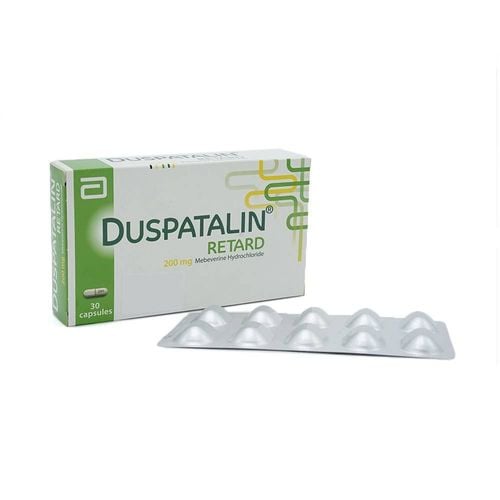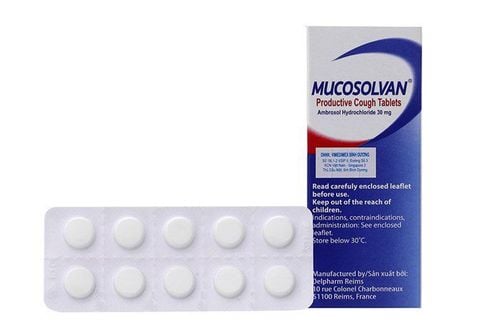1. Uses of Trimebutine tab
1.1. Indications
Trimebutine, a pharmaceutical drug containing the active ingredient Trimebutin maleate 200mg, is indicated in the following cases:
Symptoms of pain due to gastrointestinal dysfunction, bloating, discomfort, indigestion in the intestines;
Postoperative paralytic ileus to enhance the recovery of intestinal activity after gastrointestinal surgery;
Treatment of acute and chronic abdominal pain in patients with bowel dysfunction (especially irritable bowel syndrome).
1.2. Pharmacodynamics
Trimebutine is a non-competitive antispasmodic drug that has serotonin antagonistic effects with a moderate affinity for peripheral opiate receptors, including delta and kappa receptors. It helps reduce abnormal bowel motility without altering normal gastrointestinal motility.
Trimebutine accelerates the gastric emptying process and regulates the contraction activity in the colon. It is used to restore normal bowel function (usually in the form of Trimebutine maleate salt).
1.3. Pharmacokinetics
Absorption: The drug is rapidly absorbed after oral administration, with peak plasma concentrations occurring approximately 1 hour after ingestion.
Distribution: Trimebutine is poorly bound to plasma proteins (approximately 5%) and passes little through the placental barrier.
Metabolism: Trimebutine undergoes primary metabolism in the liver to form contributing or N-monodesmethylTrimebutine (active metabolite in the colon). This metabolite further undergoes N-demethylation to form N-didesmethyltrimebutine. Trimebutine is also sulfated and conjugated with glucuronic acid for excretion from the body.
Excretion: The drug is excreted mainly in the urine, with a small amount found in the feces (approximately 5-12%). The half-life of the drug is approximately 10-12 hours.
2. Dosage of Trimebutine Tablets
The dosage of Trimebutine tablets depends on the patient's condition and response to the medication. The drug is taken orally, and it is recommended to be taken before meals for better therapeutic effects. The recommended dosage of Trimebutine maleate 200 mg is as follows:
- Adults: The usual dose is 300 mg per day, taken before meals, and it may be increased to 600 mg per day depending on the clinical condition of the patient.
- The recommended treatment duration is 3 days, with a maximum treatment duration of 7 days if no warning signs are present.
- It is advised not to use the medication to treat children under 12 years of age. If it is necessary to use it, a prescription from the treating doctor is required.
3. Side effects of Trimebutine tab
Trimebutine maleate 200mg can cause some side effects as follows:
- Common: Diarrhea, indigestion, dry mouth, bad breath, nausea, epigastric pain, drowsiness, dizziness, fatigue, cold and headache, feeling hot, occasional rapid heartbeat;
- Uncommon: Rash, rash;
- Rare: Increased blood GPT, and GOT levels;
- Unknown frequency: Breast enlargement, menstrual problems, urinary retention, anxiety, and mild deafness.
4. Notes when using Trimebutine
4.1. Contraindications
Contraindicated in children under 2 years old, patients who are sensitive to Trimebutine maleate or any ingredient of Trimebutine.
4.2. Precautions for Use
General precautions:
Do not exceed the prescribed dose of Trimebutine.
If the patient does not show improvement in symptoms after a period of using the medication, they should notify their doctor.
Trimebutine is not recommended for patients with lactase deficiency, galactose intolerance, or galactose or glucose malabsorption syndrome (a rare genetic disorder).
Precautions for pregnant women:
Animal studies have shown no evidence of teratogenic effects, malformations, or toxicity during pregnancy. However, to ensure safety, it is best not to use Trimebutine maleate during the first trimester of pregnancy.
Pregnant women should only use the medication for treatment if prescribed by a doctor. If pregnancy is discovered during treatment with Trimebutine, notify the treating doctor to decide whether to continue the medication.
Precautions for breastfeeding women:
The medication should only be used when absolutely necessary (when the benefits outweigh the risks).
Precautions for drivers and machine operators:
Trimebutine tablets may cause side effects such as drowsiness, nausea, dizziness, etc., which can impair concentration and driving ability. Therefore, patients should exercise caution if they experience any of these side effects.
5. Trimebutine drug interactions
Trimebutine can interact with the following drugs:
- Trimebutine increases the central nervous system inhibitory effect of 1,2-benzodiazepine;
- Abametapir, abacavir, acemetacin, aceclofenac, acetaminophen... reduce the excretion rate of trimebutine, and increase the concentration of the drug in the serum, leading to an increased risk of toxicity and side effects of the drug;
- Acetazolamide reduces the effect of Trimebutine when used concurrently;
- Trimebutine increases the hypoglycemic effect of Acetohexamide, and acarbose;
- Trimebutine increases the risk of bradycardia of Acebutolol.
Drug interactions occur to change the drug's ability to work, and increase the risk of toxicity and side effects. Therefore, patients need to inform their doctor of all medications they are using as well as allergy and irritation medications to ensure safety and effectiveness when taking the medication.
Trimebutine is an antispasmodic drug that works on smooth muscles of the gastrointestinal tract, and it is indicated for the treatment of symptoms such as pain caused by gastrointestinal dysfunction, bloating, discomfort, and indigestion. To ensure effective treatment and avoid side effects, users should follow the instructions of their doctor or pharmacist.
For more health, nutrition, and beauty information to protect the health of yourself and your loved ones, follow the website of Vinmec International General Hospital.
Please dial HOTLINE for more information or register for an appointment HERE. Download MyVinmec app to make appointments faster and to manage your bookings easily.
To arrange an appointment, please call HOTLINE or make your reservation directly HERE. You may also download the MyVinmec app to schedule appointments faster and manage your reservations more conveniently.








